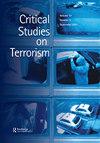The emergence of “extremism”: exposing the violent discourse and language of “radicalization”
IF 2.5
Q2 POLITICAL SCIENCE
引用次数: 5
Abstract
wealth of materials placed in the footnotes. Frédéric Lenoir’s film Le cri étouffé (2017), along with the documented fact collected from websites such as www.syriauntold.com, will shake the unconvinced to take Haj-Saleh’s theoretical grappling less as an intellectual luxury and more of an undertaking with life-or-death consequences. The first part simply ushers unprepared readers into the monster’s snares or Dante’s Inferno. For once galvanised, no reader can emerge seeing the world with his former anesthetised self. The second part is more technical but no less ambitious. Representation is presumed to open what otherwise will remain a closed temporality. The latter finds comfort in clichés and truisms. The author provides solid evidence as to how the Arabic language, through affinities with the patrimonial, has incarcerated authentic human experience. Indeed, it is the trust in representation where readers note Haj-Saleh’s penchant for the palliative. He notes a quagmire, but he fails to see it for what it is: a mode production. The Atrocious becomes an immanent logic whereby value (not just profit) can be extorted through the industrialisation of chaos. Forgoing the Hegelian law of necessity, the one that tips the balance of Assadism in transitioning from possibility to actuality, results in a narcissistic approach that blinds us to the obligation of reversing, never reforming that immanent logic.“极端主义”的出现:揭露“激进化”的暴力话语和语言
在脚注中放置了丰富的材料。弗雷姆·莱努瓦的电影《Le cri》(2017),以及从www.syriauntold.com等网站上收集的记录事实,将动摇那些不相信哈吉·萨利赫理论的人,让他们不再把哈吉·萨利赫的理论斗争视为一种智力上的奢侈,而更多地将其视为一项关乎生死的事业。第一部分只是把毫无准备的读者带进魔鬼的陷阱或但丁的地狱。一旦被激发,没有一个读者可以用以前麻醉的自己来看待这个世界。第二部分技术性更强,但同样雄心勃勃。表象被假定为打开了封闭的时间性。后者在陈词滥调和老生常谈中找到安慰。作者提供了确凿的证据,说明阿拉伯语如何通过与世袭的亲缘关系,禁锢了真实的人类经验。事实上,正是由于对代表的信任,读者才注意到哈吉-萨利赫喜欢采取缓和手段。他注意到了一个困境,但他没有看到它的本质:一种模式生产。“残暴”成为一种内在逻辑,通过这种逻辑,可以通过混乱的工业化来勒索价值(不仅仅是利润)。黑格尔必然性法则在从可能性到现实的过渡中打破了阿萨德主义的平衡,放弃了它,导致了一种自恋的方法,使我们看不到逆转的义务,永远不会改革内在的逻辑。
本文章由计算机程序翻译,如有差异,请以英文原文为准。
求助全文
约1分钟内获得全文
求助全文

 求助内容:
求助内容: 应助结果提醒方式:
应助结果提醒方式:


